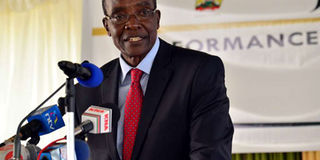Chief Justice Maraga's legacy lies in staying independent

Chief Justice David Maraga addresses guests during the launch of an evaluation report titled Performance Management Measurement Understanding for the year 2015/2016 at the Supreme Court on June 8, 2017. The success during Chief Justice Maraga’s tenure lies in fitting in the big shoes left by Justice Willy Mutunga. PHOTO | FRANCIS NDERITU | NATION MEDIA GROUP
What you need to know:
- The allegations of the Executive having attempted to exert undue pressure on the Judiciary.
- There is also the option of petitioning the Judicial Service Commission for the removal of a judge for misconduct.
Chief Justice David Maraga’s tenure as the head of the Judiciary enters its eighth month with nothing much to write home about in terms of successes or failures as it is probably still too early for him to have even settled in office.
One issue that has nevertheless been a matter for debate since soon after he took office has been the talk and perception that the Executive has been attempting to interfere and influence the operations of the Judiciary.
It was alleged that the executive and legislative arms of government were uncomfortable with certain court decisions made against them — a recent case in point being the order given by Judges Chacha Mwita and George Odunga temporarily injuncting Parliament from hearing a petition seeking the removal of the Auditor-General, Mr Edward Ouko, from office.
AUTONOMY
The allegations of the Executive having attempted to exert undue pressure on the Judiciary, to have certain judges transferred from their dockets, however, remain unsubstantiated to date and, indeed, seem to have been far-fetched.
The Chief Justice has now and again defended the Judiciary’s independence when the same has been questioned both by the government and the opposition.
He also recently came out strongly to restate the ability of the Judiciary to fairly arbitrate on any matter, including the pending Court of Appeal constitutional case in which the Independent Electoral and Boundaries Commission has appealed against a High Court verdict that confirmed the declaration of the presidential election results to be at the constituency level.
WILLY MUTUNGA
It is, indeed, a matter for which the opposition has threatened to boycott the coming elections if the Court of Appeal finds otherwise.
It should, however, not be lost on the Chief Justice that his success or failure will more or less be measured on how he guards the independence of the Judiciary from influential, extraneous forces.
Should he be able to hold forte, and protect judges from unnecessary, unwarranted attacks, then even without assessing his performance on other aspects of leadership, his tenure will have largely been successful.
And this informs why, inasmuch as retired Chief Justice Willy Mutunga had other shortcomings, more so in undertaking his administrative duties, which he seemed to have abdicated many times, thereby leaving a void eventually abused by his juniors, part of whom are now facing criminal charges in court, his tenure remains largely successful as he holds an enviable record as the Chief Justice that religiously guarded and protected the independence of the Judiciary, free from interference from any quarter.
FIRING OF JUDGES
It is not long ago that we heard politicians, including the Majority Leader in the National Assembly, Mr Aden Duale, suggesting that he would move a Motion in Parliament to censure a judge due to decisions he had made against the government even when such rulings could be overturned in the Court of Appeal and on a second appeal to the Supreme Court.
There is also the option of petitioning the Judicial Service Commission for the removal of a judge for misconduct.
Making political pronouncements against any judge would, therefore, only confirm malice on the part of those complaining.
COLLABORATION
The success during Chief Justice Maraga’s tenure, therefore, lies in fitting in the big shoes left by Justice Mutunga.
He should carry on from where the predecessor left, guard the independence of the Judiciary, but should not forget that he cannot also operate in isolation.
The Judiciary is one amongst the three arms of government that have to complement one another as and when necessary so long as the same does not translate to being directed on what decisions to make and/or how the Judiciary should be run and/or managed.
DEMOCRACY
It is quite unfortunate that one of the judges who was, at one point attacked and threatened with discussion in Parliament, is among the very best (brilliant, hardworking and fiercely independent), a fact well known to every lawyer in this country.
Threats directed at him would, therefore, be meant to intimidate him.
Were the Judiciary to lose relevance, what would follow would be a lawless, free-for-all society, as it is the very last port of call for both the weak and mighty and the cornerstone on which a democratic country stands and is built.
Mr Sumba is an advocate of the High Court of Kenya. [email protected]





